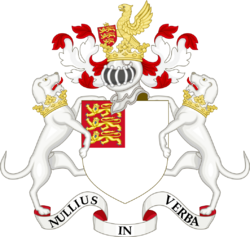Philosophy:Nullius in verba
Nullius in verba (Latin for "no one's words" or "take nobody's word for it"[1]) is the motto of the Royal Society. John Evelyn and other fellows of the Royal Society chose the motto soon after the Society's founding in 1660.[2]
Meaning and etymology
The Royal Society website says that the motto is "an expression of the determination of Fellows to withstand the domination of authority and to verify all statements by an appeal to facts determined by experiment."[1]
The phrase comes from Horace's Epistle to his benefactor Maecenas, where he claims not to be devoted to any particular sect but is rather an eclectic by nature.[3][4][5] The motto was extracted from the first of two hexameters, as indicated in bold:
Nullius addictus iurare in verba magistri, – quo me cumque rapit tempestas, deferor hospes.
("No one is addicted to swearing by the words of the teacher, – to which whenever the storm takes me, I am carried away as a guest.")[6]
The minor planet known as 11059 Nulliusinverba in the asteroid belt is named after the expression.[7] The phrase is also widely used and cited elsewhere.[8][9][10][11][12][13]
References
- ↑ 1.0 1.1 "History of the Royal Society". https://royalsociety.org/about-us/history/.
- ↑ Hunter, Michael Cyril William (1995). Establishing the New Science: The Experience of the Early Royal Society. Boydell Press. p. 17. ISBN 0851155065. https://books.google.com/books?id=T8YHw7bRx2wC&q=nullius&pg=PA17.
- ↑ Shuckburgh, E.S. (1888). The Epistles of Horace, Book I. Cambridge. p. 1. https://archive.org/details/bub_gb_EJEnVxkMpkIC. (Latin)
- ↑ Francis, Philip (1846). Horace Vol. II. Harper & Brothers. p. 9. https://books.google.com/books?id=6wAqAAAAYAAJ&pg=PA9. (English translation)
- ↑ Horace (1753). The Works of Horace, Vol. II. Davidson. p. 206. https://archive.org/details/bub_gb_FJooAAAAYAAJ. (see footnote)
- ↑ Horace: Epistles, Book I, epistle I, lines 14 and 15
- ↑ (11059) Nulliusinverba, International Astronomical Union, Minor Planet Center
- ↑ Butterworth, Jon (2017). "Take nobody's word for it – evidence and authority in a world of propaganda". London: The Guardian. Archived from the original on 2017-03-30. https://web.archive.org/web/20170330044317/https://www.theguardian.com/science/life-and-physics/2017/jan/22/take-nobodys-word-for-it-evidence-and-authority-in-a-world-of-propaganda.
- ↑ Anon (2016). "Editorial: Nullius in verba". Nature Physics 12 (9): 817. doi:10.1038/nphys3890. ISSN 1745-2473.
- ↑ Goldacre, Ben (2010). "Nullius in verba. In verba? Nullius!". Archived from the original on 2016-03-11. https://web.archive.org/web/20160311200245/http://www.badscience.net/2010/06/nullius-in-verba-in-verba-nullius/.
- ↑ Amonette, William E.; English, Kirk L.; Ottenbacher, Kenneth J. (2010). "Nullius in Verba". Sports Medicine 40 (6): 449–457. doi:10.2165/11531970-000000000-00000. ISSN 0112-1642. PMID 20524711.
- ↑ Stirling, Andy (2011). "Intolerance: retain healthy scepticism". Nature 471 (7338): 305. doi:10.1038/471305a. ISSN 0028-0836.
- ↑ Livermore, Martin (2013). "Nullius in verba: take nobody's word for it. The Royal Society should encourage more debate, says The Scientific Alliance". Cambridge: Cambridge Network. Archived from the original on 2016-06-06. https://web.archive.org/web/20160606123917/http://www.cambridgenetwork.co.uk/news/nullius-in-verba-take-nobodys-word-for-it/.
External links
 |


